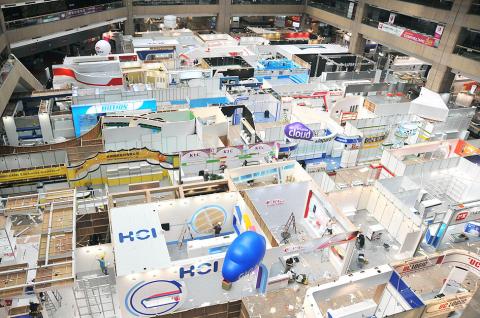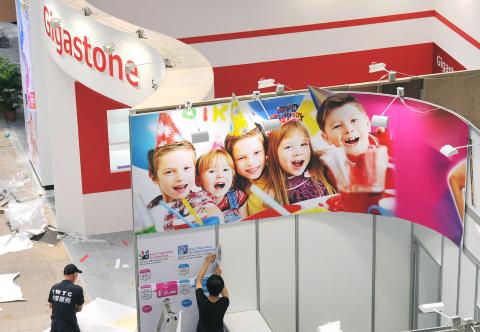Asia’s largest tech trade show will be a battleground for smart innovations when it begins in Taiwan tomorrow — pitting new inventions, such as car systems which warn the user if they are driving badly to a toothbrush-style camera that films the user’s teeth, against each other.
More than 1,500 exhibitors, including some of the world’s leading technology brands, will set out their stalls at Computex in the Taipei World Trade Center, with 130,000 visitors expected to attend the five-day event in the Taiwanese capital.
This year’s edition is to feature a new SmarTech area featuring smart wearables, 3D printing, intelligent vehicle systems and security — a move which organizers say reflects the increasing role of smart technology in all parts of everyday life.

Photo: Mandy Cheng, AFP
“We’re looking to interest everybody, from ordinary people to government officials,” said Chang Li (張笠), deputy secretary-general of the Taipei Computer Association, a co-organizer of the show.
Watches, rings and wristbands that connect to Internet cloud services that collect and analyze data is a dominant trend for the new generation of wearables being showcased, Chang said.
“Smart wearables are not a new technology, but combining them with cloud computing means the wearer’s data is collected all day every day, is analyzed and can predict your body’s condition, giving warnings of potential health problems,” he said.

Photo: Mandy Cheng, AFP
The nation’s leading personal computer maker, Acer Inc (宏碁), announced on Friday the launch of its first wearable device, the Liquid Leap smartband, which will make its debut at Computex.
The one-inch touchscreen smartband has fitness tracking, phone and SMS notification and music control, and will be sold together with the Liquid Jade smartphone. The devices will also link to Acer’s new cloud services as the struggling company tries to transition away from PCs to revive its fortunes.
“I think the introduction of the SmarTech area shows how dynamic Taiwanese companies are,” Singapore-based tech blogger Alfred Siew said. “Computex has traditionally been a very PC-focused show because there are a lot of PC and component manufacturers there.”
“But since last year there has been a prominent shift towards mobile devices — tablets and phones. Taiwan is a very dynamic economy when it comes to adapting to change,” he said.
The show will also have a zone dedicated to convertible tablets as they try to elbow laptops out of the market, a “touch display” area and one for mobile cloud computing.
Microsoft, Intel and Asus (華碩) are among the major players attending Computex, but it is also a platform for lesser-known brands and start-ups.
Taiwanese company Abeltech (亞柏工業) won a pre-show Best Choice award for its Cloud Intraoral camera, which is shaped like a toothbrush and videos the inside of the user’s mouth, linking the high-definition footage to smartphones and tablets.
In the intelligent vehicle offerings will include a car system which gives a warning to drivers if they swerve out of lane, organizers said.
“There are a lot of small innovative start-ups in Asia, which will want to use Computex as a place to show their technology,” said Nicole Peng (彭路平), Shanghai-based analyst for market research firm Canalys.
However, while the latest smart devices may deliver the biggest wow factor, the less glamorous aspects of computer technology, from motherboards to components, will also play their part at Computex — and are essential to the region’s success in the tech world, Peng said.
“The region is not as outspoken or as loud as Silicon Valley, but I think a lot of mainly smaller-scale innovations happen here, on the components side and materials side,” she said.
“There’s a need to keep on innovating because now, in the hardware area, the key is new materials and new components — for example, sensors are very important these days for innovation,” Peng said.
“Many Silicon Valley start-ups look for their components here, in [South] Korea, Japan, Taiwan. That’s still a very important area for them,” she added.

Intel Corp chief executive officer Lip-Bu Tan (陳立武) is expected to meet with Taiwanese suppliers next month in conjunction with the opening of the Computex Taipei trade show, supply chain sources said on Monday. The visit, the first for Tan to Taiwan since assuming his new post last month, would be aimed at enhancing Intel’s ties with suppliers in Taiwan as he attempts to help turn around the struggling US chipmaker, the sources said. Tan is to hold a banquet to celebrate Intel’s 40-year presence in Taiwan before Computex opens on May 20 and invite dozens of Taiwanese suppliers to exchange views

Application-specific integrated circuit designer Faraday Technology Corp (智原) yesterday said that although revenue this quarter would decline 30 percent from last quarter, it retained its full-year forecast of revenue growth of 100 percent. The company attributed the quarterly drop to a slowdown in customers’ production of chips using Faraday’s advanced packaging technology. The company is still confident about its revenue growth this year, given its strong “design-win” — or the projects it won to help customers design their chips, Faraday president Steve Wang (王國雍) told an online earnings conference. “The design-win this year is better than we expected. We believe we will win

Chizuko Kimura has become the first female sushi chef in the world to win a Michelin star, fulfilling a promise she made to her dying husband to continue his legacy. The 54-year-old Japanese chef regained the Michelin star her late husband, Shunei Kimura, won three years ago for their Sushi Shunei restaurant in Paris. For Shunei Kimura, the star was a dream come true. However, the joy was short-lived. He died from cancer just three months later in June 2022. He was 65. The following year, the restaurant in the heart of Montmartre lost its star rating. Chizuko Kimura insisted that the new star is still down

While China’s leaders use their economic and political might to fight US President Donald Trump’s trade war “to the end,” its army of social media soldiers are embarking on a more humorous campaign online. Trump’s tariff blitz has seen Washington and Beijing impose eye-watering duties on imports from the other, fanning a standoff between the economic superpowers that has sparked global recession fears and sent markets into a tailspin. Trump says his policy is a response to years of being “ripped off” by other countries and aims to bring manufacturing to the US, forcing companies to employ US workers. However, China’s online warriors